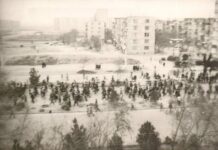WikiLeaks-Armenia No 61
2007-10-17
S E C R E T YEREVAN 001257
SUBJECT: EX-PRESIDENT (AND CANDIDATE) TER-PETROSSIAN MAKES N-K POINTS
Classified By: CDA R.V. Perina, reasons 1.4 (b,d)
¶1. (S) SUMMARY: Former President Levon Ter-Petrossian (LTP) asked CDA to convey points on Nagorno-Karabakh to Minsk Group negotiator Matthew Bryza. LTP said he met recently with new NK “President” Bako Sahakian, and found in him a credible partner to discuss N-K settlement options. Ter-Petrossian said it was important for the “NKR” authorities to be more closely involved in the negotiation process. Finally, in view of President Kocharian’s upcoming departure from office, LTP thought the Minsk Group Co-Chairs should draft a document to capture the latest state of negotiations. He did not want this to be reported as his idea, however; he hoped Bryza would propose this to the other co-chairs as his own initiative. LTP asked to meet with Bryza at the next opportunity. END SUMMARY.
¶2. (C) The former president invited CDA to a meeting so that he could raise some ideas on the N-K issue, which he asked be conveyed to special negotiator (EUR DAS) Matthew Bryza. His first points were straightforward. He noted that he recently had met in Stepanakert with new “NKR President” Bako Sahakian, and the two had had a good conversation. He said that Sahakian was a relative political neophyte, with the bulk of his experience in defense and security. Nonetheless, LTP found him rational, willing to learn, and someone who well understands the key issues confronting N-K. LTP said Sahakian was open to reasonable arguments and would be willing to entertain some compromises to achieve a settlement. LTP also said that Sahakian and the “NKR’s” representatives should be more closely involved in the negotiations.
¶3. (S) LTP’s main point was that he felt that there needed to be some formal document that would record what has been achieved during the “Kocharian era” of N-K negotiations. He suggested that perhaps the best way to do that would be for the Minsk Group Co-Chairs to draft a formal document proposing to the two sides a settlement plan, which would encompass all the elements that have been effectively agreed upon already. Whether or not the two sides accepted the proposal — and the presumption was that they would not at this stage — the existence of such a document would have the effect of documenting the culmination of negotiations at the close of the Kocharian administration. This would have the beneficial effect of locking in those points that have already been agreed, so that the next president would not lose ground, but would be able to pick up smoothly where negotiations had left off. He thought it important that this be in the form of a formal Co-Chairs’ document.
¶4. (S) LTP was anxious that the proposal not be presented as his idea, and asked that this fact be kept secret. He proposed, instead, that DAS Bryza suggest the idea to his Russian and French counterparts as his own idea, and that the three Co-Chairs then present it to the two sides as a joint Co-Chair initiative. CDA promised to convey all these points to DAS Bryza.
¶5. (S) COMMENT: Apart from the possible merits of the idea, we see several political purposes to this N-K engagement from LTP. First, we suspect that at some point during the upcoming presidential campaign he will want to be able to say that he has discussed the N-K issue with the U.S. This would be a building block in his efforts to show that he is a serious and credible alternative to Serzh Sargsian. Second, if he should manage to become president (which he sees as a serious possibility), the existence of a document such as he describes could be a valuable public relations weapon for him. Since he is seen as “soft” on N-K — indeed that perception was what toppled him from power in 1998 — if he later makes a peace deal with Azerbaijan, he would likely want to be able to show how similar his deal is, in substance, to what Kocharian (the great Karabakh partisan) was prepared to accept. Ter-Petrossian did not, however, imply that the document should be made public at this point.
PERINA
[U. S. Ambassador to Armenia]













